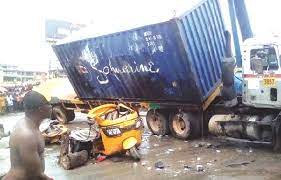ETO Call-up: NPA To Deny Unsafe Trucks Access Into Ports
After several consultations with stakeholders, including the leadership of the various trucking groups doing business at the Port, the Nigerian Ports Authority (NPA) has mandated the implementation of Minimum Safety Standards (MSS) scheme for trucks, anchored on the “Eto” platform, effective Thursday 1 July 2021.
This action by the Authority, aimed at bringing to an end the incessant breakdown of trucks on the Port access corridor, is in furtherance to the understanding reached with the Lagos State Government (LASG), as a panacea in the enforcement of the “Eto” call-up system, designed to facilitate smooth transit of bulk cargoes and container carrying trucks going to the Port.
Hence forth, only trucks confirmed by the NPA to have met the MSS requirements and duly issued with an MSS certificate will continue to be active on the “Eto” platform managed by the system operator – Truck Transit Parks Limited (TTP). Any truck or vehicle not confirmed or certified will be denied access to initiate bookings on the “Eto” platform until it has met all MSS requirements as stipulated by the NPA.
Owners of trucks yet to meet the MSS requirements are advised to approach the NPA Safety Department at any of the two Port locations in Lagos for appropriate guidance. After the truck is certificated, the truck details are to be uploaded on “Eto” in order for the truck to continue doing business at the Port.
The Authority’s MSS scheme is sequel to a Memorandum of Understanding (MoU) signed between NPA and the Federal Road Safety Corps (FRSC), a move to stem the increasing cases of trucks break down and containers falling off articulated vehicles inside the Port and on the highways, which had claimed hundreds of lives and destruction of properties. It was initially introduced in 2017, but was suspended in order to give truck owners enough time to meet the required standards.
The scheme stipulates that all trucks doing business inside the Port must go through a safety audit and be certified as fit-for-purpose. Absence or defect of certain vehicle parts and accessories will disqualify a truck from certification. The safety inspection covers items that include the truck head, driver and vehicle particulars, trailer carriage unit, tyres, brake system, lifting jack, vehicle lights, driving mirror and speed limiter. The items checked will be recorded as satisfactory or non-satisfactory after the inspection.
While soliciting the support and co-operation of Port users, especially truck owners, the Authority enjoined industry stakeholders to join hands to keep the Ports safe. Trucks doing business at the Port must meet stipulated standards of road worthiness to enhance the productivity of Nigerian Ports and check unnecessarily carnage on our roads.





